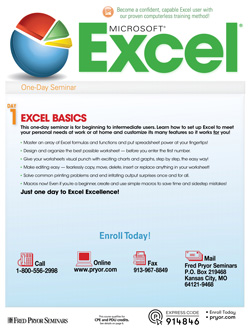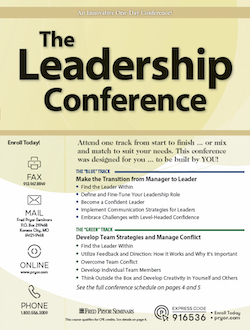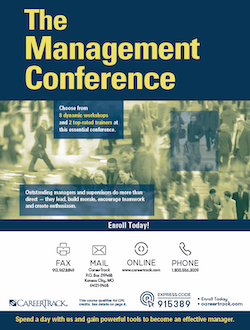Discover the Best Mentoring Plan
- Author: Sheryl McAtee
- Categories:
- Tags:
- Share on:
Abigail Adams once wrote, “Learning is not attained by chance. It must be sought for with ardor and attended to with diligence.”
If you are involved in a mentor/mentee relationship, you already know the importance of creating a plan for career growth and development. And you know that goals are only achieved when they are “attended to with diligence.”
While you understand the importance of working with others to help you achieve goals, you might benefit with information in structuring your meetings to make the most of your time together.
Today’s blog provides you tips on structuring your mentoring sessions. We’ll give you a basic mentoring program template and share educational opportunities to help you become a better leader and coach.
Mentoring Sessions – Make a Plan!
There are several ways to structure a mentoring relationship. They range from a free-flow exchange of ideas to a focused mentoring plan. Let’s look at two types of mentoring sessions.
Free-Flow Exchange of Ideas
Some mentees want someone to talk with about the ups and downs of their career. They have specific questions about their jobs and would benefit from conversations with someone in their industry. During this free-flowing exchange of ideas, the mentor offers insights and stories about their career development to guide the mentee.
While this type of exchange helps a motivated employee achieve helpful insights, be careful that it doesn’t turn into a gripe session – with no beneficial outcome.
Focused Mentor Session
Other mentees require a more structured approach. Their questions and concerns may be too complex for a single conversation. These mentees may benefit from structured or focused mentoring sessions that enable them to achieve specific goals.
What type of mentoring session is best? Both types of sessions have their benefits. The mentee’s and mentor’s characteristics and personalities play a role in the session that works best for them. However, goal-oriented mentees generally prefer to follow a concrete program outline to structure the meetings.
Concrete mentoring exercises help your mentees experience real-world successes on a problem important to them. Designing a mentoring program plan around these exercises provides an excellent structure for mentoring success.
Are you a mentor but unsure where to start? Let us help by giving you a general step-by-step plan for your sessions.
Create a Mentoring Plan
Before the meeting, review the mentee’s current resume, LinkedIn page and job description to learn more about them. This enables you to have a productive first session.
Session One: Introductions and Goals
In the first session, spend time getting to know each other. Ask the mentee to share what they want from the mentoring relationship. Some mentees may come with specific goals while others may seek general guidance. Ask open-ended questions that encourage them to think about their aspirations and dreams.
Homework: If the mentee cannot articulate specific goals, you might need to encourage them to think more about their hopes, dreams and what they wish to achieve.
SAVE $10 AND TRAIN ON THIS TOPIC TODAY
Session Two: Narrow Focus, Establish an Action Plan
The real work begins in the second session. In this session, ask for feedback about the most important goal for the mentee. If they are still having difficulty creating specific goals, use some of these problem statements as an exercise during the session.
- I want to develop my skills in ___ so that I can ___.
- I want to provide stronger and/or more effective feedback to ___.
- I want to position myself for a new position in my organization.
- I want to build a stronger professional network.
- I want to improve my relationship and/or reduce conflict with ____.
Homework: Ask the mentee to select one problem statement to focus on during the next session.
Session Three: Establish an Action Plan
In this session, help the mentee develop a specific action plan that addresses their problem statement. Help your mentee visualize what they will do, with whom and by when.
Their action plan might involve specific training that makes them a more valuable and promotable team member. For example, they might benefit from communication training or grammar and business writing training to help them develop their writing and speaking skills.
Perhaps they need additional sales training to help them reach their monthly quotas or time management training to help them learn how to meet deadlines.
Homework: Encourage the mentee to work on their action plans. Ask them to complete key steps before your next meeting. These steps might include enrolling in a class, adding LinkedIn connections or meeting with a problem coworker.
Step Four: Debrief Mentoring Session
During this session, find out how the work toward the goal is going. If it’s going well, ask them what is going well and what does that mean for the future? If it is not going well, explore with the mentee what they should try next. If no action took place, ask them what is getting in the way of getting started or moving forward with their plan.
After you debrief, determine the next logical step that allows them to achieve their goal.
The key is to focus on incremental action learning. The mentee takes action through an exercise, learns through that and then takes another step.
Homework: Encourage the mentee to continue work on their action plan.
Step Five: Repeat
Repeat these learning exercises in future sessions, either building on the same problem statements with new actions or addressing different problem statements in sequence. Continue if the mentee finds value in the relationship.
As a leader, mentor or manager, encourage your employee or mentee to keep achieving and growing. But don’t forget to do the same for yourself.
Think About Your Own Development
Your objectives as a manager or a supervisor may include recruiting, training and helping your employees establish personal development and career goals. Some of you might be excited by this part of your job, but others may feel that they need more training on how to help others be the best employees they can be.
Pryor Learning offers courses to help you become a great manager or supervisors. In turn, this enables you to provide you with the skills to help your team become the best they can be.
Pryor Learning Courses to Help You Establish a Mentoring Plan
We’ve given you a general outline for mentoring sessions, but there’s much more to becoming a great leader. If your goal is to inspire, encourage and motivate your mentee and team to reach great heights, here are some courses for you.
Be the Manager Your Employees Want to Follow
We started this blog with a quote from Abigail Adams. She must have known something about inspiring others to greatness as she was a close advisor of her husband, President John Adams and the mother of President John Quincy Adams.
In fact, we wonder if John Quincy Adams was thinking about his mother when he wrote, “If your actions inspire others to dream more, learn more, do more and become more, you are a leader.”
Learn to become this type of leader with proven strategies developed by the best business minds in the world.
In Be the Manager Your Employees Want to Follow, you’ll learn solid tactics to boost employee or mentee engagement and improve productivity. If your organization is struggling following the Great Resignation, attend this one-day course to inspire loyalty so your top talent won’t walk out the door.
How Managers Become Great Leaders
Do you struggle with or are you uncomfortable developing your coaching skills? Perhaps you are looking for specific ways to strive for and achieve personal excellence as a leader. Inspire your team achieve personal and professional success by enrolling in How Managers Become Great Leaders
Leadership, Team-Building, and Coaching Skills for Managers and Supervisors
If you prefer live, online events, sign up for this exciting session. Learn to be like Abigal Adams – the person who motivates, guides and encourages their mentees or employees. This one-day team-building seminar teaches coaching methods utilized in the world of athletics to help create winners in the business world.
You can request that the previous seminars be brought to you for on-site training if have an entire team that could benefit from learning how to become better leaders.
Coaching Skills – Beyond Basic Supervision
Finally, invest in your employees by becoming the insightful, encouraging manager they deserve. Learn how to be a resource for your employees when they are struggling and how to guide and develop your employees and mentees. Do you want to become an inspiring mentor? This one-hour webinar can help.
About Pryor Learning
Since 1970, Pryor Learning has helped more than 13 million people reach their career goals by offering comprehensive, affordable, and convenient business, compliance and safety training. Pryor Learning excels at helping mentors and managers become better leaders for their mentees and employees.
Learn more about how Pryor Learning can help you develop your mentoring and leadership skills by visiting Pryor’s website.
Choose a Seminar and Save $10
Styles & Strategies to Supervise Effectively
1 Day
- CEU: 0.6
- CPE: 6
Team Training - Virtual or In-person

Spark Innovation and Think Strategically
1 Day
- CEU: 0.6
- CPE: 6
Team Training - Virtual or In-person

How to Manage Remote Employees
1 Day
- CEU: 0.6
- CPE: 6
- HRCI: 5.5
- PDC: 6
Team Training - Virtual or In-person
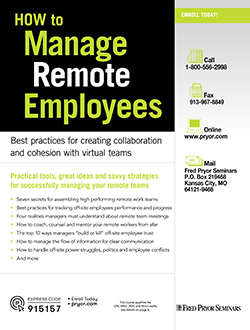
How to Supervise People
1 Day
- CEU: 0.6
- CPE: 6
- PDC: 6
Virtual Seminars:
-
Apr 16
-
Apr 17
-
Apr 22
-
+ 26 more dates
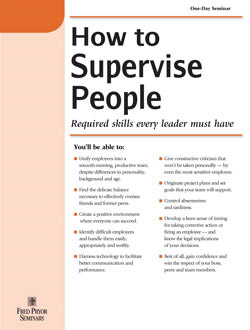
Facilities Management - A 2-Day Comprehensive Course
2 Days
- CEU: 1.2
- CPE: 12
Virtual Seminars:
-
Apr 16-17
-
Apr 23-24
-
Apr 29-30
-
+ 25 more dates

Managing with Assertive Confidence
1 Day
- CEU: 0.6
- CPE: 6
Virtual Seminars:
-
Apr 16
-
Apr 22
-
May 8
-
+ 3 more dates

Leadership, Team-Building and Coaching Skills for Managers and Supervisors
1 Day
- CEU: 0.6
- CPE: 6
- HRCI: 5.5
- PDC: 6
- PDU: 6
Virtual Seminars:
-
Apr 16
-
Apr 17
-
Apr 18
-
+ 41 more dates
In-Person Events:
- Apr 16, San Diego, CA
- Apr 22, Indianapolis, IN
-
+ 20 more dates

Transitioning to Supervisor
1 Day
- CEU: 0.6
- CPE: 6
Virtual Seminars:
-
Apr 17
-
Apr 18
-
Apr 22
-
+ 41 more dates
In-Person Events:
- Apr 22, Phoenix, AZ
- Apr 23, Ontario, CA
-
+ 14 more dates
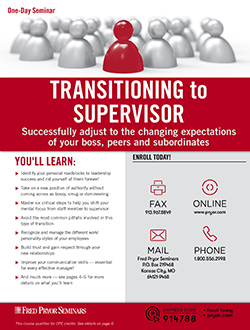
Leadership & Management Skills for Women
1 Day
- CEU: 0.6
- CPE: 6
Virtual Seminars:
-
Apr 17
-
Apr 29
-
May 7
-
+ 8 more dates

How to Supervise Bad Attitudes and Negative Behaviors
1 Day
- CEU: 0.6
- CPE: 6
- HRCI: 5.5
- PDC: 6
Virtual Seminars:
-
Apr 17
-
Apr 22
-
Apr 25
-
+ 18 more dates

Management & Leadership Skills for New Managers and Supervisors (2-Day)
2 Days
- CEU: 1.2
- CPE: 12
Virtual Seminars:
-
Apr 17-18
-
Apr 22-23
-
Apr 24-25
-
+ 32 more dates
In-Person Events:
- Apr 16-17, Atlanta, GA
- Apr 29-30, Denver, CO
-
+ 21 more dates

How Managers Become Great Leaders
1 Day
- CEU: 0.6
- CPE: 6
Virtual Seminars:
-
Apr 17
-
Apr 18
-
Apr 23
-
+ 16 more dates
In-Person Events:
- Jul 22, Nashville, TN
- Jul 25, Las Vegas, NV

A Crash Course for the First-Time Manager or Supervisor
1 Day
- CEU: 0.6
- CPE: 6
- HRCI: 5.5
- PDC: 6
Virtual Seminars:
-
Apr 18
-
Apr 22
-
Apr 24
-
+ 27 more dates
In-Person Events:
- Jun 13, Phoenix, AZ
- Jun 18, New York, NY
-
+ 2 more dates

Criticism & Discipline Skills for Managers and Supervisors
1 Day
- CEU: 0.6
- CPE: 6
- HRCI: 5.5
- PDU: 6
Virtual Seminars:
-
Apr 23
-
May 6
-
May 15
-
+ 13 more dates

The Indispensable Office Manager
1 Day
- CEU: 0.6
- CPE: 6
Virtual Seminars:
-
Apr 23
-
May 1
-
May 6
-
+ 5 more dates
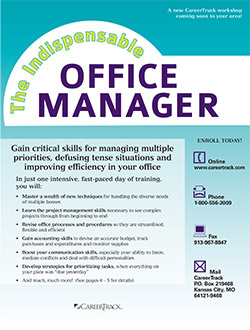
Be the Manager Your Employees Want to Follow
1 Day
- CEU: 0.6
- CPE: 6
- PDC: 6
Virtual Seminars:
-
May 5
-
May 8
-
May 14
-
+ 5 more dates

How to Improve Employee Accountability with Remote and In-Person Teams
1 Day
- CEU: 0.6
- CPE: 6
- PDU: 6
Virtual Seminars:
-
Jun 3
-
Jun 9
-
Jun 18
-
+ 5 more dates

The Exceptional Team Leader
1 Day
- CEU: 0.6
Virtual Seminars:
-
Jun 3
-
Jun 9
-
Jun 18
-
+ 5 more dates

